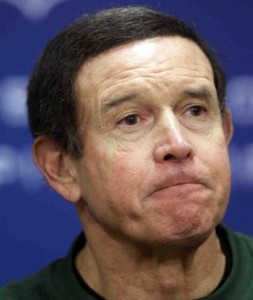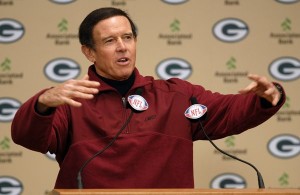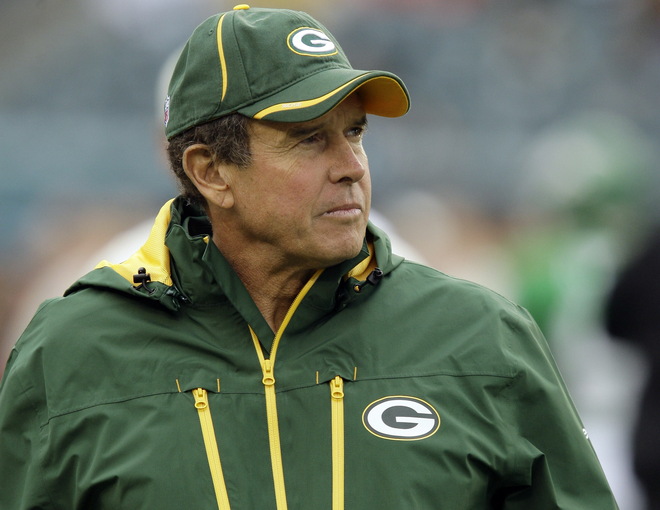Dom Capers: Helping or Hindering the Green Bay Packers?
Dom Capers, the Defensive Coordinator for the Green Bay Packers, is perhaps the most polarizing figure on the team today outside of the General Manager himself, Ted Thompson. Since his hire in 2009, and changing Green Bay’s defensive scheme from the 4-3 to the 3-4 he was familiar with, Capers has become famous for his “hybrid positions,” his “exotic blitzes,” his “all-or-nothing” defensive philosophy, and his “maybe-it’s-real-but-maybe-it’s-not” hair style.
We all know the Packers won the Super Bowl in Capers’ second year with the team, performing well in just about every major defensive category, especially interceptions. In addition, Green Bay is coming off of a victory over the New York Jets, one which saw the defense tighten significantly and throttle the Jets for much of the second half. But has he really been effective as Green Bay’s defensive guru? That is to say, is Capers’s defensive strategy and philosophy sustainable on a longer timeline?
Today we will look at some basic stats that outline a defense’s play at several different facets of the game, represented by the Packers’ ranking among the 32 NFL teams that year. Before we get to the rankings, however, let’s go over the reasoning behind the stats chosen.
The Stats That Matter
- Basic Game Management: 1st downs per game, 1st downs per play, yards per game, yards per play, offensive points allowed
 We all know yards don’t win football games, just like singles don’t win baseball games; but they certainly don’t hurt your chances. These stats represent Caper’s overall game management, planning, and just plain-old effectiveness. If you’re giving up a lot of yards, you’re giving up a lot of field, a lot of time, and a lot of player energy. Offensive Points Allowed are also included in this column, simply because, as we all know, they are the most important factor of all.
We all know yards don’t win football games, just like singles don’t win baseball games; but they certainly don’t hurt your chances. These stats represent Caper’s overall game management, planning, and just plain-old effectiveness. If you’re giving up a lot of yards, you’re giving up a lot of field, a lot of time, and a lot of player energy. Offensive Points Allowed are also included in this column, simply because, as we all know, they are the most important factor of all.
- Defensive Strategy and Play-Calling: 3rd Down Conversion Percentage, Red Zone Scoring Percentage
Over the course of a season, many different things, many different players, and many different plays can all lead to offensive points and yards. However, there are a few areas that can be broken down and looked at as coach vs. coach play-calling situations. Times when a very specific set of circumstances are drawn up, placed in front of the coach, and must be decided upon. Here, we will use 3rd Down conversions and Red Zone Efficiency for this. If you’re giving up a lot of yards per play, you better be good at catching an offense when they get stuck in a 3-and-long situation. If you’re giving up a lot of yards in general, you better be able to adjust in the Red Zone and force a FG or a stop. When you know a team needs a specific number of yards to obtain a clear goal, whether a 1st down or a TD, you need to be able to react and plan accordingly.
- Overall Defensive Philosophy: Interceptions Made, Fumbles Recovered, Sacks per Play, Missed Tackles
What’s more important? Big flashy plays, or fundamentals?
Here we arrive at the crux of the matter: Dom Capers’ overall defensive philosophy. Most intelligent fans watching the Packers over the last few years know Capers looks more for the big plays than the efficient ones, and relies far too heavily on the luck of an errant pass becoming an interception. Rather than teaching the strategy and form that goes into not only forcing a fumble, but successfully recovering one, Dom has become reliant on the fact that he’s in the NFCN, and can count on the other QBs in the division to throw a pass his way. Because of this, Packers players just don’t seem to have the skill-set, or drive, to force fumbles consistently, or even just make clean tackles.
Do the stats really support these thoughts, though? The answer, as you’ll see below, is yes.
Packers Defense: Sustainable Instability
Below is a table that illustrates the Packers’ defensive success at these various stats over the last 4 years, leaving out Capers’ first year, as he was in a new system with new players. The stats are represented as the Packers’ ranking in the NFL, 1st being the best possible performance, 32nd being the worst.
| 2013 | 2012 | 2011 | 2010 | |
|---|---|---|---|---|
| 1st-downs per game | T-24th | 14th | 29th | 5th |
| 1st-downs per play | 27th | 10th | 29th | 5th |
| Yards per game | 24th | 16th | 32nd | 5th |
| Yards per play | 28th | 17th | 31st | T-12th |
| Offensive Points Allowed | 25th | 18th | 22nd | 2nd |
| 3rd Down % Allowed | 18th | 20th | 27th | 9th |
| RZ Scoring % Allowed | 20th | 28th | 18th | 15th |
| Ints Made | T-28th | T-12th | 1st | 1st |
| Fumbles Recovered | T-24th | T-28th | T-28th | T-25th |
| Missed Tackles | 20th | 14th | 23rd | 17th |
| Sacks per Play | 5th | 4th | 32nd | 4th |
What About 2010?
As you can see from the table above, 2010 was the fluke year for Dom Capers, not the norm. It was much like the 2011 Jim Schwartz year for the Lions. He was a relatively new guy in a relatively unusual system and he managed to make it work for the first couple years of his tenure in Green Bay. Relying on a shock-and-awe philosophy that needed interceptions to come their way to make it work. Unfortunately, this style of “Big play or no play” is clearly not sustainable. Sure, sacks and interceptions look great on the highlight reel, but they aren’t going to reliably win you football games if the team needs more than just offensive output to win a game.

However, even in Capers’ best year with the Packers, cracks in his coaching style were already starting to appear. He was already being out-coached in the Red Zone, and despite excelling in most other aspects, he was still unable to keep the team in the elite ranks of 3rd-down stops. Most notably though, the team was already in the bottom half of the league in terms of missing tackles and failing to make fumble recoveries. Capers’ style of preaching route-jumping instead of form-tackling was already beginning to show its weaknesses. Unfortunately, 2010 was only the beginning.
The Normal Excuses
“But the team is winning, isn’t that’s what’s important?”
To which I will answer, it is in spite of Dom Capers’ defense, not in any way because of it. The only stat keeping the Packers afloat in the division currently is the one stat the Packers have consistently relied on since 2011, Offensive Production:
| 2013 | 2012 | 2011 | 2010 | |
|---|---|---|---|---|
| Offensive Points Scored | 7th | 6th | 2nd | 9th |
It sure is nice to have that offense making up for the defensive ground lost during a game, but once playoff time comes, and the Packers face the best defenses the league has to offer, it isn’t going to be, and hasn’t been, enough.
“The players are the ones screwing up on the field.”
That excuse can only work for so long, and only if you completely disregard the effect any coach can have on a team. One player could blow an assignment, and that’s on him. If a second player does it, it could still just be coincidence. When it is happening consistently over the course of many seasons, there is a fatal flaw in the defensive coaching as a whole.
If a player is missing tackles consistently, it’s the job of the coaching staff, and the coordinator running that staff, to improve the player. If multiple players are missing those tackles, and continue to miss those tackles, those players shouldn’t continue playing, unless the person making the personnel decisions doesn’t care much about that part of the game.
“Everyone is always injured. He needs better players.”
All coaches need better players, it’s the ones who can deal with that problem well who succeed. If a coach can’t adjust to the talent he has, he’s not a very good coach. Capers is notorious for throwing whoever he’s got available into whatever crazy blitz package he might feel like running at the time, regardless of that player’s skill set. A great player in a flawed system is just as effective as an average player in a great system. Now, if you take an average player and put him in a flawed system, you get what the Packers currently have on defense.
Fire Dom Capers
What I’m really trying to get at is this: The Packers need to part ways with Capers, and they need to do it now. Rodgers isn’t getting any younger, and the Packers defense needs a severe shot in the arm if they hope to do anything in the playoffs. If the Packers’ plan is to win Super Bowls (and if you’re lucky enough to have one of the best QBs in the game, that better be the plan) and not simply make it to the playoffs to be bounced by a team that actually DOES understand how to play defense, Ted Thompson should be accepting Defensive Coordinator resumes from wherever he can get them.
The Packers’ defensive slide is clear, and the reasons for it are even clearer. The Packers need a coach who cares about tackling, who cares about game planning, and most importantly, who cares about improving not only his players, but his own defensive strategy when things don’t work. Dom Capers is clearly not the man for that job.

